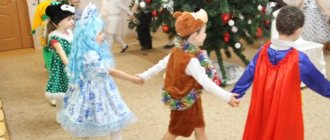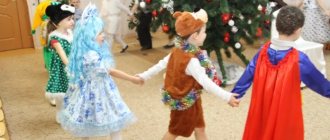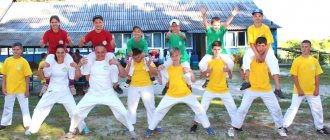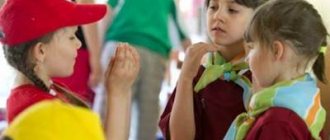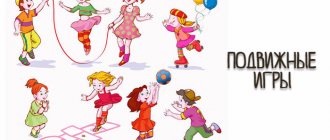On the first day of summer camp, adults are faced with an important task: introducing children. To do this, counselors organize and conduct games for getting to know each other. At camp, children must establish relationships with each other in a short time. Games are best suited for this. They are an important activity for children and are closest to them, because the average age of vacationers in summer camps is from 9 to 12 years.
Games for getting to know each other at the camp for children are held in the first 2-3 days from the beginning of the shift. First you just need to introduce the children and find out their names. Children must distinguish each other and identify the children of their squad. Initial acquaintance games are well suited for this. The camp organizes a dating evening as soon as possible. Ideally, it will pass on the first day.
Let's start getting acquainted!
The counselor should remember that the words “exercise”, “activity” when communicating with children in the evening are undesirable. You can captivate the guys with the phrase: “Let’s get to know each other in an interesting way!”, or: “I think we all want to get to know each other!” Then start the game kindly and energetically.
"Guess my name!"
Children line up in one line. The first child comes out of it so that he can be seen and says: “Guess what my name is?” and says the first letter of his name. The one who guessed guesses the next name.
"Snowball"
Children stand in a circle. The first child says his name, the second - the name of the first and his own. The third is the first, the second and yours. Names “grow” like a “snowball” and children quickly remember them.
Even if children remember each other's names, this does not mean that they have met. On the first evening, it is useful to find out about the children's hobbies. This information will help the counselor get the kids interested in clubs and squad activities, and help his comrades make friends based on similar interests.
To do this, the counselor can prepare questions for getting to know each other. At camp, such “interviews” should be conducted cheerfully and energetically. Children love when music plays at an event and the whole action looks like a competition.
"Who?"
The adult asks, and the children run forward, smiling and bowing.
- Who came to the camp for the first time?
- Who is 10 (11, 12) years old?
- Who completed 3 (4, 5) grade?
- Who came not alone, but with a friend?
- Who likes to draw (play football, read)?
The counselor calls the children who come out by name, lightly touching their shoulders.
By participating in initial get-to-know-you games, each child begins to feel like a stranger in the group. Other children become familiar to him, and he himself reveals himself to his comrades as a person.
Competitions are held
"Patterner"
The squads take turns pronouncing the found tongue twister - whoever completes the task more amicably wins.
"Sing a Song"
The troops sing a well-known song in the voice of the animal depicted in the found illustration.
“Who can count?”
A certain number of peas are laid out on a chair in the center of the hall and covered with a cloth. One player from each team comes out, they sit down in turn on a chair and name the expected number of peas on the chair. The one who answered correctly brings a winning point to the team. If no one has named the correct answer, then other players from the teams come out, then third ones. And so on until the desired number is named.
"Squad Name"
Using the collected natural material, lay out the name of the squad on the ground.
Presenter: Our guys are friendly and savvy. I think they deserve a holiday in our camp.
Host: I completely agree. But our holiday does not end - now there will be a disco!
Presenter: And this means many, many more games and competitions!
Next is a disco.
Continuation of acquaintance
On the second day, adults can hold a “Dating Light at Camp,” where children will continue to establish interpersonal relationships. At this meeting they actively communicate and get to know each other better. Children take part in choosing the name, anthem, and mascot of their squad. The purpose of Ogonyok is to introduce the entire camp staff. A “Greeting” competition is held for all units. This is a great opportunity for every child to show their talent.
Games for secondary acquaintance in the camp can be carried out after all participants in the shift have become sufficiently familiar. Activities related to common interests will allow children to have fun spending time together.
Competition "Lion Hunt"
Props : a bucket with a lion on it (or any other container), four balls.
Presenter 2 : “So, dear friends! Your ships have been drifting in the ocean for two weeks now, and in order to prevent a riot from starting, you urgently need to replenish supplies of provisions and drinking water.”
Presenter 1 : “And for this you will have to land on an island that is not marked on any map. There is probably water and food on this island, because the captains of both ships saw through telescopes that there was vegetation on it.”
Presenter 2 : “However, I do not recommend landing on land in full force: who knows what might await travelers there. I suggest that the four bravest team members explore the territory. Come out, bravest sailors! Two volunteers from both teams!”
The presenters form two lines of participants, each of them is given a ball, and opposite the lines, at a distance of 1-2 meters, they place a container on which a lion is drawn.
Presenter 2 : “And then our brave scouts unexpectedly came across a hungry lion in the wild jungle that covers the entire territory of the island. To survive, they will have to fight, however, no one thought to take weapons with them and all that our fearless sailors have is four stones. If all four stones do not hit the target, then the lion will eat our heroes and the teams will be left without water and food."
Children take turns throwing balls into the bucket and then return to their teams.
Competition "Understand Me"
Props : cards on which tasks are written (see below).
Presenter 1 : “After the scouts returned on board, the captains of both teams decided to send five people from their teams ashore so that they could bring more food and water. So, I invite ten volunteers to participate in the next test: five participants from both teams!”
Presenter 2 : “Imagine (addresses the players) that aborigines live on the island, who, naturally, speak their own language and do not understand Russian. You are faced with a difficult task: if something goes wrong and the locals get it wrong, the ship's crew could become their lunch. Therefore, our heroes will have to learn to express themselves using gestures.”
The presenters line up the members of both teams in one line so that they all look in the same direction. Then he gives the person who is last in the line a card with a task (a phrase that will indicate the action, object, command; for example: “let’s bury the treasure”; “let’s go eat, the cook has prepared dinner”; “let’s go wake up the captain”) . The task of each participant in the game (the one at the end of the line shows first): non-verbally (i.e., without words) explain the task to the participant in front. At the end of the game, the child standing first in the line says the task out loud as he understood it.
The presenters can give several tasks in a row, or, if there is not much time allocated for games, only one.
Competition "Raise Anchors"
Props : two anchors, handmade from thick cardboard, two equal pieces of thick thread.
Presenter : “It’s time to set sail! In order for the teams to continue their journey, they need to raise anchors. I call two sailors to come to me!”
“Sailors” from both teams approach the leader, who hands each of them one cardboard anchor. Threads are tied to the anchors.
The task of the participants is to wind the threads onto the “anchors” as quickly as possible, trying to get ahead of the opponent.
Presenter 2 : “Well done, sailors! And now, my dear sailors, I propose to go home to our native shores!”
Competition "Sailor Dance"
Presenter 1 : “Congratulations! The teams successfully returned home! The ships are moored, the teams have gone ashore! It's time to perform the traditional "sailor dance"!
Incendiary music sounds (for example, the famous melody “Apple”) and the presenters ask four volunteers from both teams (two participants from each team) to perform any dance (the movements can be arbitrary).
In this competition, the winners are determined by the audience or presenters. The winner is the couple that uses the most unusual movements or can quickly react and perform a couple dance.
Examples of games for in-depth acquaintance
"Business card"
For the task you will need: old magazines to cut out pictures from them; scissors, colored pens, pencils, glue, thick paper.
Children make their own business cards. You can draw, paste pictures on a piece of paper or write words that relate to the child’s personality, character and hobbies. By putting the finished business cards together and pulling one out, the children jointly decide who the owner of this card is. After the game, the cards can be hung on the wall for general viewing.
"Glomerulus"
You will need: a large ball of thread.
The presenter announces the topic of discussion and starts the game. While telling the story, he winds a ball of thread around his fingers. After the presenter’s story ends, he passes the ball to another participant. When all the children have spoken, the adult summarizes all the stories. The point of the conclusion is that the children’s statements have a lot in common. This unites them, like a ball of thread.
Sample topics for discussion:
- "I like when…"
- “I want to talk to a friend about...”
- "I would like to…"
- “I must admit, I’m afraid when...”
- “I’ll never forget when...”
- “This incident influenced the rest of my life.”
This exercise can be carried out throughout the entire period of the camp shift. Middle school children enjoy opening up, expressing themselves, and hearing the “secrets” of others. They begin to realize that their problems and experiences are typical of their peers.
Dating games at camp for children promote friendly and open communication. The guys get new positive impressions from their summer life together.
Dating games - video
Scenario of the competitive game program “Dating Island”
One of the organizers turns on the music (preferably the song “A friend is with us”).
The music becomes quieter and the first presenter says: “Good morning, boys and girls! Good morning, colleagues! If the day starts well and the morning is really good, then you know what that means? This means that the whole day will go with a bang! Congratulations to everyone on the fact that another happy day awaits us!”
The second presenter continues: “Yes, dear friends! I'm sure we'll have a joyful day full of fun! Today each of us will find many new friends! Tell me, guys, what do you do when you meet a friend?”
The children answer in chorus (the presenters can prompt them): “We say hello!”
Second presenter : “Well done! I suggest you play a very simple but very interesting game! Now I will read a poem, and everyone present here should guess the meaning when it would be appropriate and say in chorus: “Hello!” So, let's begin:
When we meet the dawn, we tell it... (The children shout in unison: “Hello!”).
With a smile, the sun gives light, sending us its... (Hello).
When you meet after many years, you will shout to your friends... (Hello).
And they will smile back at you from a kind word... (Hello).
And you will remember the advice: give to all your friends... (Hello).
Let's all say it together, in response, to each other... (Hello).
First presenter : “Hello! Yes, yes, hello, everyone!”
Second presenter : “Yes, guys, we are now on the “Dating Island,” but soon we will have to go on an exciting journey through the “Ocean of Friendship.” Now we will explain how you can build a ship and assemble a team to control it!”
Competition "Build a Team"
Number of participants : 12 people (two teams, each with 6 participants).
Props : 12 cards on which the names of all “ship” positions are written (navigator, cabin boy, sailor, first mate, captain, pilot). The presenters must distribute these cards to all participants in the game.
After the cards have been distributed to the children (in random order), two teams are formed. The captains of both teams must line up their “subordinates” in two lines, in accordance with their position, from left to right. After this, they must take turns saying the names of all team members and their rank.
Competition "Draw a ship"
Number of participants : 8 people (4 players from both teams).
Props : two easels, colored pencils, two sheets of whatman paper.
The presenter arranges the game participants in two lines, four people in each, and places easels opposite them, at a distance of 2-3 meters. All participants are given pencils before the game (two pencils per participant).
Then, at the leader’s signal, players from both teams take turns running up to the easels and drawing ships (they are given 30 seconds to run and draw something). The team that draws the ship first wins.
After the game, the first presenter says: “Well done, guys! Congratulations! Now we have two teams and two ships! After this, another presenter plays the song “A friend is with us.”
Competition “Compose a letter”
Props : two sheets of paper with “ciphers” written on them (see below), as well as two glass bottles with a wide neck (in which you can easily place pieces of paper and also pull them out).
Presenter 1 : “Attention! Ship crews! I announce that your two ships have been sailing in the ocean for 7 days now, and one morning, when the sailors were repairing the sides of the ships, they saw this in the water (shows two bottles to the children). In these bottles, my colleague and I (points to the second presenter with his hand) found two encrypted notes (takes out pieces of paper from the bottles and shows them to the children). Now I need four people! Captains! Choose the two smartest members from your teams!”
The captains select four volunteers and they approach the leaders.
The presenters invite the participants to “decipher” two messages found: nouns are written on pieces of paper in a chaotic order, from which the players must make sentences.
So, examples of “ciphers”.
First option: “storm”, “Portuguese”, “captain”, “fugitive”, “villain”, “thief”, “treasure”, “shipwreck”, “island”, “aboriginal”, “raft”.
Second option: “cannibal”, “African”, “sailor”, “dagger”, “hunger”, “ocean”, “riot”, “murder”, “shipwreck”, “sabotage”, “hero”.
There are no losers or winners in this competition: children tell the stories they succeeded in. They are given 5 minutes to “decipher.”

